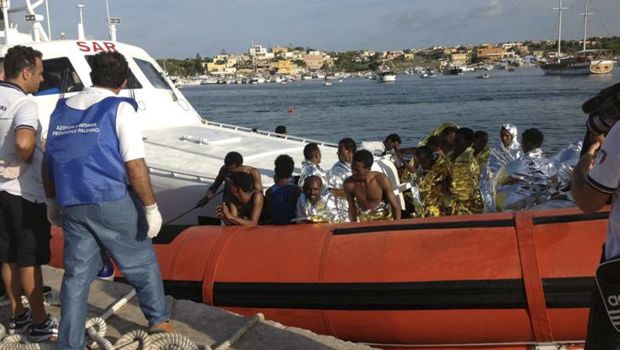We are witnessing a daily tragedy. This is the news of the sinking of boats carrying hundreds of migrants, whether in the Mediterranean off the coast of Italy, or in the Indian Ocean between the Indonesian and Australian coastlines. The latter incident saw a number of Lebanese migrants attempting to reach Australia drown before they could reach safe shores.
In the Mediterranean, around 400 migrants drowned within a week, while in the Indian Ocean—particularly the thousands of sea miles that separate Australia and Indonesia—dozens drowned to death in the latest incident. As for the survivors, or shall we say those who did not fall prey to this tragic maritime adventure, they are forced to return to their countries of origin having endured this difficult journey, perhaps even losing loved ones on the way.
The facts and figures speak for themselves, drawing a picture that deserves consideration. These migrants, which include women and young children, are well aware of the risk they face in boarding these primitive boats and sailing across open waters to illegally enter another country. They also pay large sums of money for this dubious privilege, estimated at several thousand dollars per head, which means that those who undertake this journey are not destitute.
Despite all this, they resort to this dangerous method to escape their current reality; this means they see no future for themselves in their own country. Another fact is that the majority of these boat migrants come from Arab countries, and this is a relatively recent phenomenon, with Arabs joining other migrants from Africa and Asia on these dangerous sea voyages. The majority of these migrants or asylum seekers are Muslims, as is clear from the names of both the survivors and victims of the recent incidents. They are all seeking to travel to the West, while the countries where they set off from, whether in the Middle East or Malaysia or Indonesia, are nothing more than a transit point on the way to their final destination.
Statistics reveal that hundred of illegal migrants seek this means of entry every week. These same figures also reveal that hundreds, perhaps thousands, are successful in reaching their destination, or else are waiting in transit points to undertake the final leg of the journey. One such place is Libya, and a report yesterday revealed that a Tripoli zoo had been transformed into a migrant processing center to deal with the huge number of migrants arriving there. These migrants are able to enter the country thanks to smugglers, who are operating, of course, in coordination with armed militias.
This is also a phenomenon, albeit a pre-existing one. However the large number of Arabs now resorting to this type of illegal immigration is something that has only happened in recent years, owing to the security deterioration in a number of states, particularly in Syria which is witnessing a bloody civil war that has led to approximately 2 million refugees. Estimates indicate that this figure could rise to approximately 4 million by 2014 if the war continues unabated.
This means that the flow of migrant boats will not stop, and indeed will only increase. Incidents of migrant boats capsizing is nothing new, and stories taken from migrants—or those who succeeded in this perilous journey across open seas—portray a people who are willing to sacrifice everything to reach what they view as the shores of happiness. Whatever the reality, these migrants who are risking their lives on the open sea are seeking something that they view as absent from their own societies, whether we are talking in terms of security, freedoms, or a better future. That is the crux of the matter. However the reality is that when they arrive, they will discover that things are not as easy as they had thought it would be. It is true that these are advanced societies, but they are also facing problems of unemployment and economic slowdown. This is not to mention competition over job opportunities, with the local population unhappy to see anybody coming in from the outside to challenge them, particularly illegal immigrants.
The only thing that could reduce this dangerous phenomenon in a practical or realistic manner is to renew hope in these societies which are witnessing a kind of mass exodus of citizens. If opportunities were available in these countries, then everybody would not be leaving them to those who turned them into wastelands in the first place. Renewing hope is also related to stability and security, and the belief among citizens that there is hope in a future where they can find suitable job opportunities, reward for hard work, a minimum of personal freedom, and respect for diversity.
As for the countries that are receiving these migrant boats, whether in Europe or Australia, they have every right to fear these waves of immigrants. However the real solution is in helping the countries where these migrants come from to develop and grow, raising the standards of living there so that citizens don’t want to leave. This may ultimately be cheaper than bearing the cost of erecting barriers and establishing security patrols to keep illegal immigrants out.
